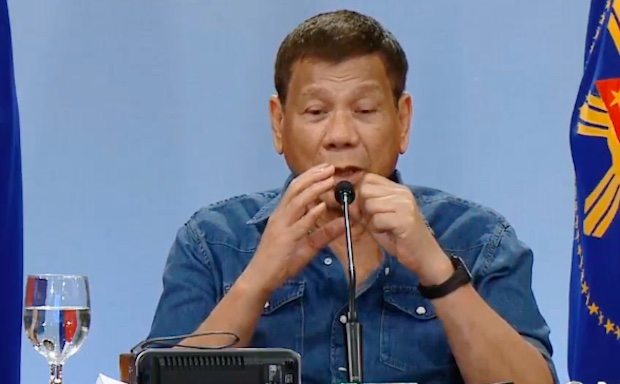Roque: Duterte ‘shrugged off’ latest ICC step toward probe

President Rodrigo Duterte (Photo from an RTVM video posted on Facebook)
MANILA, Philippines — President Duterte has “shrugged off” the request of the former chief prosecutor of the International Criminal Court (ICC) for a full-blown investigation of the extrajudicial killings (EJKs) under his war on drugs as he believes the evidence against him is hearsay, Malacañang said on Thursday.
The move of Fatou Bensouda is “no big deal,” according to presidential spokesperson Harry Roque, who earlier said the possible probe was “legally erroneous” and “politically motivated” and Mr. Duterte would never cooperate with it.
“You know, he shrugged it off,” Roque said at a press briefing. He said he had sent a copy of Bensouda’s opinion to Mr. Duterte, and the latter noted that it mostly cited reports from certain media outfits.
“After we saw the 52-page decision, knowing that they were citing Rappler and ABS-CBN and Inquirer, we calmed down a bit because in law, all these newspaper accounts are mere hearsay,” he said.
In her request to the ICC’s Pre-Trial Chamber, Bensouda also cited as sources reports from human rights groups, other sources that were redacted, as well as the President’s own words.
She said the “plethora of public statements made by Mr. Duterte and other government officials encouraging, supporting and, in certain instances, urging the public to kill suspected drug users and dealers” were evidence of a state policy to attack civilians.
‘We are confident’
But Roque said lawyers know hearsay evidence would not stand in court.
“And since you need the judicial authorization to proceed with an investigation, lawyers know that you cannot start any proceedings on the basis of hearsay evidence,” Roque said. “So, we are confident. Even if it proceeds to … an investigation, what I’m saying is that its sources all come from the media and leftist groups, so it would not stand because there is also a stage in the ICC called confirmation of charges.”
The ICC, unlike domestic courts, would have to confirm the charges in the Pre-Trial Chamber, Roque said.
“So it’s no big deal, and we will allow … the [Department of Justice] to do its job, because that is really the obligation of the Philippine state: to investigate, prosecute and punish if need be,” he said.
In her farewell speech, Bensouda said her office had undertaken the “lengthy process of planning, preparing and taking measures to preserve” the integrity of the evidence in anticipation of an inquiry into the drug war.She had also asked that the probe include EJKs in Davao City in 2011 to 2016.The new ICC chief prosecutor is Karim Khan.
As Khan assumed office on Wednesday, former United Nations special rapporteur for human rights Agnes Callamard urged him to give “urgent attention” to, among others, the three-year-old case accusing Mr. Duterte and the chief architects of the drug war of crimes against humanity.
‘Last resort’
In an open letter on behalf of Amnesty International, of which she is now secretary general, Callamard said ICC investigations in the Philippines, Palestine and Afghanistan were a “last resort in situations that have remained in the blind spot of international justice, especially because powerful states have blocked and hindered accountability for decades.”
“The importance of your office’s work cannot be overstated. Indeed, investigations in these situations represent momentous breakthroughs for justice, after years, if not decades, of nonaccountability,” she told Khan.
Apart from the Philippine case, Khan also inherited probes in Palestine, Afghanistan and Myanmar, whose leaders are now facing charges of crimes against humanity and war crimes.
In these countries, state leaders have invoked the principle of complementarity to obstruct the ICC’s investigations and evade international scrutiny.
Under Article 17 of the Rome Statute that established the ICC, complementarity means that the ICC may only exercise jurisdiction when national legal systems fail to genuinely prosecute crimes under international law.
Malacañang asserts that the ICC has no power to probe the drug war because the government has been prosecuting suspected perpetrators of EJKs.
But since 2016, there has been only one drug war-related conviction—that of the three Caloocan City policemen involved in the murder of 17-year-old Kian delos Santos in 2017.
“In our view, complementarity does not mean primacy of state proceedings at all costs, in particular when states are not genuinely willing or able to investigate and prosecute crimes under international law,” Callamard said in her letter to Khan.
Parallel probe
“As you take office, we strongly urge you … to recognize that such an overly deferential approach to states does not represent complementarity, but rather complicity with major-power impunity,” she said.
The global Human Rights Watch (HRW) has urged the UN Human Rights Council to launch a parallel inquiry that will cover even the EJKs from when the Philippines withdrew from the Rome Statute.
If anything, the extent of the ICC’s engagement in the Philippine case “clearly illustrates that there is a need [earlier identified] by the UN Office of the High Commissioner for Human Rights, now reinforced by the ICC prosecutor, for there to be a complete independent investigation” of the Philippines’ human rights situation, HRW Geneva director John Fisher told reporters at a briefing. INQ














